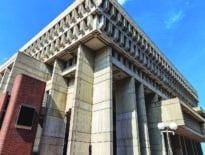
Rick Dimino
The recent record-setting heatwave should serve as an alarming reminder that climate change is already threatening our communities, our infrastructure and businesses in Massachusetts. The current projections for rising temperatures and extreme heat demand urgent action in Greater Boston.
In the absence of federal action on climate legislation, we are fortunate to have policymakers in city and state governments, as well as the business community, who understand the need for the commonwealth to pass aggressive and achievable buildings policies to continue our role as a national climate leader. Buildings are the number-one source of emissions in Boston and the second largest source of emissions statewide, so decarbonizing our building stock is essential to achieving the climate commitments of a net zero economy by 2050.
Cambridge Breaks from Peers
Municipalities like Boston and Cambridge, are taking actions to reduce emissions from large existing buildings. The city of Boston signed an updated Building Emissions Reduction and Disclosure Ordinance, or BERDO 2.0, into law in October 2021, requiring existing buildings to reduce emissions every five years, with the goal of reaching net zero by 2050.
A Better City was grateful to partner with the city of Boston in the development of the BERDO 2.0 and we believe it is an aggressive but achievable policy that targets our largest emitters while also protecting our most vulnerable communities.
Meanwhile, members of the Cambridge City Council are proposing an update to their Building Energy Use and Disclosure Ordinance (BEUDO) with the target of making sure existing buildings reach net zero by 2035. This approach runs counter to the work of their own Office of Community Development and BEUDO stakeholders, as well as utilities’ own net zero by 2050 timeline.
This advanced timeline and process is not something A Better City can support, based on the technological and workforce development challenges discovered in our work for BERDO 2.0 in Boston. Hopefully, we can find a workable compromise with the Cambridge City Council that ensures better alignment and consistency across emission standards, and then build on this for all the building policies across the commonwealth.
Local Fossil Fuel Bans a Bad Idea
At the state-level, the Department of Energy Resources continues to update the state’s current stretch energy code and develop a specialized municipal opt-in stretch energy code, consistent with the climate bill passed 2021. These codes, along with an update to the base building code, will become effective in January 2023.
Within the State House, the legislature recently passed a new bill to encourage the clean energy and offshore wind sectors. This legislation contains beneficial language that develops a new reporting mechanism for existing large buildings over 20,000 square feet, consistent with the threshold under BERDO 2.0 and an earlier iteration of BERDO that focused on reporting and disclosure.
As of this writing, it was unclear whether Gov. Charlie Baker would veto a concerning section of the bill, allowing 10 municipalities to ban the use of fossil fuels in new developments. Either way, this proposal never should have made it to his desk. Such ideas effectively create a fourth building code for developers to comply with, separate from updates to the state stretch energy code currently being finalized.
A Better City has asked the governor to veto this specific proposal, as it does not specify how it aligns with the state’s other building codes and provides no clarification of the energy grid’s capacity to support an increase in electricity demand from fully electrified buildings. Setting new rules for 10 of what would likely be the state’s wealthiest and most well-resourced municipalities would likely exacerbate inequities by forcing lower income neighborhoods to support fossil fuel infrastructure and carry an increased energy burden.
Collaboration Necessary to Move Forward
Building owners, developers and tenants deserve consistency across building policies to justify needed investments in deep energy retrofits and building decarbonization initiatives, As our downtowns, businesses and regional economy continues to rebound from the economic impacts of the COVID-19 pandemic, misaligned and patchwork building policies can confuse and stall developers, leading to even greater delays, increased costs in construction and potentially discourage new investment in this region.
City and state agencies alike must continue to proactively work with the real estate and development communities to develop aligned and consistent building polices, while also exploring necessary technological innovations and transitional financing strategies like carbon offsets to promote carbon sequestration and carbon removal technology, or a climate bank that could fund decarbonization initiatives across capital budget cycles. Collaboration between utilities and the public sector is also essential to modernize the grid and to increase renewable energy development that delivers the needed green energy capacity that leads to our emission reduction commitments.
While we hope the federal government changes course and rises up to this challenge, Massachusetts can move forward on these smart, consistent approaches toward building emission reduction and energy use policies. If we continue on this path, Massachusetts can achieve a cost-effective transition to a decarbonized economy and we can help to address our most-pressing climate challenges.
Rick Dimino is CEO of A Better City.





